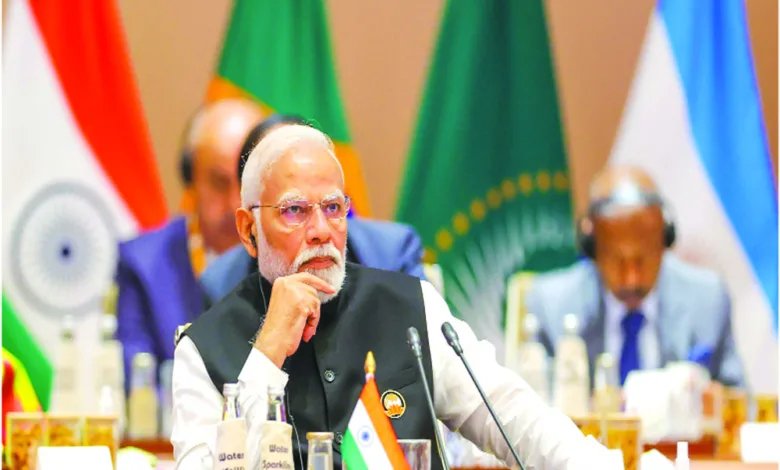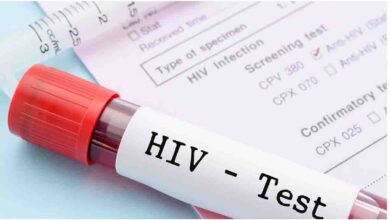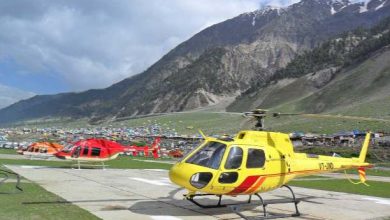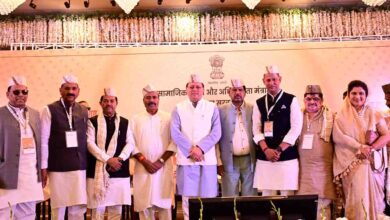MODI CHANGES THE CLIMATE

Monday, 11 September 2023 | Rahul Datta | New Delhi
Urging the world to adopt a human-centric vision, the Prime Minister Narendra Modi on Sunday exhorted global leaders to resolve to meet the challenge of climate change through a green development plan and work for sustainability and stability.
He also called for reforms in international bodies like the United Nations (UN) and described cyber security and crypto currencies as among the burning issues affecting the present and future of the world.
Making these assertions in his concluding remarks at the end of the two-day G20 Summit, the Prime Minister underlined that crypto currency is a new subject for social order and monetary and financial stability and sought the development of global standards to regulate it.
He wrapped up the mega event with “Swasti Astu Vishwa” — a Sanskrit prayer for peace — as he handed over the gavel of the G20 presidency to the President of Brazil, Luiz Inácio Lula da Silva.
The Prime Minister Modi said in his closing remarks, “I declare the end of the G20 Summit. Hoping the road map of ‘One Earth, One Family, One Future’ will be joyful. Thank you!”
Earlier in the day, the Prime Minister received the G20 leaders and delegation heads at New Delhi’s Rajghat. They paid floral tributes to Mahatma Gandhi, followed by a tree-plantation ceremony at the G20 venue, Bharat Mandapam.
Addressing the global leaders during the ‘One Future’ session of the G20 Summit, Modi noted that sustainability and stability were as important as transformation to keep pace with a fast-changing world.
In this context, he urged the leaders to resolve to implement a Green Development Pact, Action Plan on Sustainable Development Goals, high-level principles on anti-corruption, digital infrastructure and Multilateral Development Bank (MDB) reforms.
Modi made a fresh push for reforms in global bodies, including the UN, saying despite the increase in member states of the world body, the number of permanent members in the UN Security Council (UNSC) has remained the same.
He said the world’s “new realities” should be reflected in the “new global structure.” The world was different when the UN was founded with 51 members. Now, the number of member states has risen to nearly 200, Modi said. It is nature’s law, Modi said, that those who don’t change with time lose their relevance.
“It is necessary that global bodies reflect today’s realities to lead the world towards a better future,” Modi said, citing the UNSC as an example of a global body needing change.
He said the world was totally different when the UN was established.
“Despite this, the number of permanent members in the UNSC remains the same. The world has since changed a lot in every aspect. Be it transport, communication, health and education, every sector has been transformed. These new realities should reflect in our new global structure,” he said. The UNSC has five permanent members: The US, China, France, Britain and Russia.
Calling for reflection, the Prime Minister noted that many regional groupings have emerged in the last many years and they have proved to be effective.
Pitching for reforms, he said that is why a historic initiative was made on Saturday by making the African Union a member of the G20.
“Similarly, we also need to expand the mandate of multilateral development banks. Our decisions in this direction should be immediate and effective,” he said.
Modi described cyber security and crypto currencies as among the burning issues affecting the present and future of the world.
Cyber space has emerged as a new source of funding for terrorism and global cooperation and framework are necessary for securing it and crypto currencies, he said. “This is a very important subject for every country’s security and prosperity,” he added. “When we take care of the security and sensitivity of every country, then the feeling of ‘One Future’ will be strengthened,” he said.
Noting that the world was witnessing unimaginable scale and speed in new generation technology, he cited Artificial Intelligence (AI) as an example and said G20 countries need to go beyond the ‘Principles on AI’ adopted by the bloc in 2019.
“I suggest we establish a framework for ‘responsible human-centric AI governance’. India will also give its suggestions. It will be our effort that all countries get the benefits of AI in areas like socio-economic development, global workforce and research and development,” he said.
Highlighting his push for a human-centric vision instead of a GDP-centric approach, Modi said India has expressed its willingness to share its lunar mission data with everyone in the interest of humanity. “It is also a proof of our commitment towards human-centric growth.”
He said the world needs to go beyond the concept of “global village” to make “global family” a reality, calling for a future in which not only the interests of the countries are aligned but also their hearts.
In a fast-changing world, sustainability and stability are as much needed as transformation, he said.
Later, Modi posted on X, “Simply having a GDP-centric approach is outdated. Time has come to adopt a human-centric vision of progress. India has been making several efforts in this regard, particularly in areas relating to data and technology. We must do whatever we can to use AI for socio-economic development.”
He added, “As we pursue our development trajectories, we must keep our focus on sustainability and stability. This will ensure empowerment of the marginalised.”
Modi noted that India’s presidency of G20 would officially continue till November 30 and over two-and-half months were left for its tenure as the head of the grouping.






